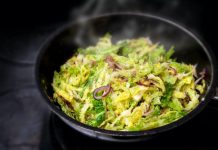We usually prefer fresh vegetables, fruits, and berries. These same frozen foods seem to contain fewer micronutrients. Let us find out whether this is really so.
Many have tried to freeze food to preserve its flavor and freshness, but inventor Clarence Birdseye was the first to do it. At the beginning of the 20th century, he watched the Eskimo fishermen, who laid out the caught fish on the ice. At a temperature of -40 ° C, the catch instantly froze. During dinner, Birdseye noticed that such fish tasted as good as fresh and took the idea into service.
Read also: How To Clean And Cut Vegetables And Fruits
Other methods of freezing are also used today. For example, vegetables are poured with boiling water before cold processing. Food with such temperature drops loses some useful elements. But remember:
Fresh foods are deprived of some of the nutrients, even if nothing is done with them.
For example, green peas lose about half of their vitamin C within 24 to 48 hours after harvest.

Bozar Ali (Ali Bouzari) and his colleagues at the University of California compared the nutrient content of frozen and fresh vegetables, but no significant differences were found; for example, more vitamin C is present in frozen corn, blueberries, and green beans than in fresh ones. Frozen broccoli also contains more vitamin B2.
Also read: How To Choose Fruits And Berries
In another study, scientists compared the content of dietary fiber, magnesium, zinc, iron, and calcium in the fresh and frozen products, but a significant difference is also not found.
Frozen vegetables and fruits stored in the freezer retain all vitamins and minerals.
Regarding the number of nutrients, there is no need for concern. The main difference between frozen and fresh foods is their taste.
Adapted and translated by The Cop Cart Staff
Sources: Life hacker







